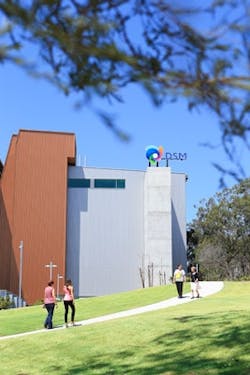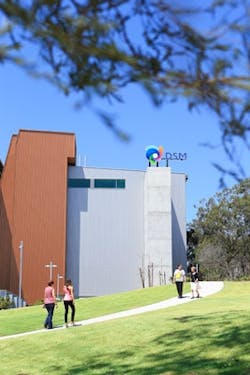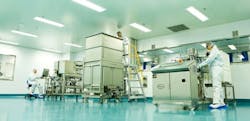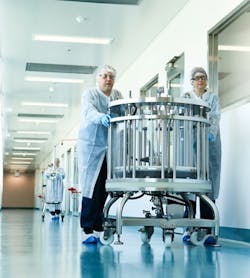Asia-Pacific Pearl: DSM's Brisbane Biopharma Facility
One can be relatively certain that for any organization initiating and executing a project as capital intensive as building a biopharmaceutical processing facility, the strategic case for its potential return on investment must be clearly articulated as well as sustainable over the long haul. For contract manufacturing organizations serving Biopharma’s growing global production capacity needs, fielding innovative, technologically advanced manufacturing assets in high-potential markets is elemental to business success.
Clearly articulating its long-term strategic and global interest in biologics, last October DSM Pharmaceutical Products, the custom manufacturing and technology business of Royal DSM, officially announced opening of its new cGMP facility for biopharmaceutical contract manufacturing in Brisbane, Australia. Australia’s Therapeutic Goods Act (TGA) regulatory agency granted the plant its A2 compliance rating, thus green lighting commercial operation. The facility was built in partnership Biopharmaceuticals Australia and some (AU) $60 million in financial backing from regional and national government agencies.
Since its opening in October, DSM has been conducting process development work and technical production runs. TGA-licensed cGMP production is scheduled to commence January 2014.
Since its opening in October, DSM has been conducting process development work and technical production runs and says that TGA-licensed cGMP production is scheduled to commence January 2014. Pharma industry analysts and financiers often find a robust supply chain of key assets analogous to a string of pearls. According to DSM, its bioprocessing pearl is contracted to serve several companies eager to be in a position to compete in Asia-Pacific market. According to DSM, “This world-class operation in the Asia-Pacific region is an important growth area in DSM’s strategic development in the biopharmaceutical field.” As it stands, the Brisbane facility is hosting manufacturing operations for DecImmune Therapeutics (US), RECEPTA Biopharma (Brazil) and two Australian firms, Parenta Biosciences and Opthea Pty Ltd.
A MODEL FOR THE FUTURE
“With its flexible design and use of single-use technology, the facility represents the model for the future of biomanufacturing,” said Lukas Utiger, president and CEO of DSM’s Pharmaceutical Products business segment at the time of the plant’s opening. “It represents an important milestone in the development of Australia-based mammalian cell-based manufacturing of biopharmaceuticals, and extends DSM’s contribution to the global biotechnology market.” The new facility, says DSM, was designed by an expert international team of biological scientists and bioengineers, “utilizing DSM’s 27 years of experience in mammalian cell culture processing to construct a purpose-built, state-of-the-art biomanufacturing facility.”
DSM’s new plant, at 86,000 square feet, may not be the world’s largest biopharmaceutical operation, but its flexible design philosophy assures that the space provides ground-breaking levels of efficiency and capacity for each square foot. DSM says the single-use approach reduces overall operational and process costs, enables rapid product change-over and reduced batch cycle times. Product capacity is projected at 500 kg annually, with bioreactor capacity ranging from 50 to 2,000 liters.
In a recent conversation with Frank Maddalo, VP of Operations/Facility Development for DSM Biologics, he revealed that the plant’s design wasn’t the only thing that required flexibility. Maddalo directed the project internally and was responsible for managing the teams designing, engineering, constructing and eventually the commissioning and qualifying of the facility.
Downstream process, says DSM, is world-class, featuring three separate DSP suites, separate buffer preparation suites, column and membrane chromatography and UF/DF, VF and NFF filtration.
Maddalo, outlining the project’s timeline, explains that while the deal was finalized in 2009, the project broke ground in June 2010. Construction started as scheduled, but in 2011, Mother Nature had other plans for DSM and its contractors. “In the midst of flooding in 2011, the construction site was completely inundated. It shut down the whole area for approximately a month, keeping the project shut down. We were completely over our time budget. Maddalo says quick thinking and the flexibility of the contractors on site found the solution to the loss of time was to tactically switch work from the Translational Research Institute (An element of the Australian Government’s Participation at the site) to DSM’s process building.” Maddalo notes that in spite of this major setback, neither the schedule nor the budget took a major hit and the project proceeded as planned.ACCESSIBLE, EFFICIENT LAYOUT
Maddalo says the Brisbane plant incorporates a variety of design strategies to facilitate operations and assure pathogen and contamination defense without impinging on accessibility by employees and customers. “One of the other interesting things we’ve done is we’ve put in corridors that traverse the bioreactor suites. We actually raised the corridor above the clean rooms. It offers a great view — you’re getting a bird’s-eye-view from the top down able to look into as many as eight out of the 10 areas at one time.”
Flexible, single-use systems support all primary biological processing operations and are one of the defining characteristics of the Brisbane facility. Another notable layout feature is the innovative way DSM manages buffer formulation in a separate preparation suite outside its clean rooms. “That keeps the clean rooms and the bioreactor rooms relatively clutter free,” says Maddalo. “You can actually run more processes and more clients at the same time in the individual rooms because they are all closed.”
Heating, ventilation and air conditioning (HVAC) equipment, says Maddalo, is arrayed above the corridor and clean rooms and totally separate from the environmental controls of the laboratory. “Which makes it convenient for operations personnel, says Maddalo. “It’s totally separate. It’s its own independent system.”
Operationally interesting is the way DSM segregates its various client’s operations from one another within the facility to mitigate any chance of cross-contamination. “Instead of having a big open theater, we have closed rooms,” explains Maddalo, “even though open spaces would have made operations a lot easier, with separate rooms to their process or product won’t be compromised by another product or process, and you can still have privacy. But with single-use systems, there’s no possibility of people introducing contamination inside the rooms or by the way people process the work.
Flexible, single-use systems support all primary biological processing operations and are one of the defining characteristics of the Brisbane facility.
Certainly DSM is banking on the efficiency and flexibility of single-use systems to support the cost-efficient processing of its multiple clients at the site. However, it’s widely understood that under certain circumstances, a full-on stainless steel processing train is actually a more sensible and economically feasible route to take. According to Maddalo, the second floor of the Brisbane building is open to this particular kind of thing with utilities and other elements ready to support more permanent process designs. “What we did was structurally reinforce the second floor and route utilities so if we had to put stainless steel in — at the discretion of the customer — we would be prepared. Rather than build a plant that forces everybody to run the way you want them to run, why not build a plant with the flexibility they need to do half and half, if they want to do that. If they need to do all stainless steel, they can do that as well.”BLUEPRINT FOR THE FUTURE
The Brisbane facility serves DSM’s blueprint for its future as far as biopharmaceutical production for its clients. Not only does the facility field current industry standard technologies, DSM has integrated its own innovative and proprietary technologies including its XD process technology and Rhobust direct capture downstream technology. Systems that optimize bioprocess manufacturing processes; driving down cost and processing times. Maddalo says DSM’s proprietary techniques and technologies can cut out several processing steps, and for that reason, earn its state-of-the-art credentials. According to DSM, its XD cell culture technology achieves 5 to 15 times higher product output than standard processes, producing very high cell densities while retaining high cell viability and consistent quality.
Offering what DSM characterizes as state-of-the-art upstream process development services, the Brisbane facility features 100% single-use upstream equipment, 250 to 2,000 liter fed batch, 50 to 500 liter XD capacity, 50 to 250 liter perfusion capabilities and advanced pre-culture/seed train that includes shake flask and wave bioreactors (2, 20 and 50 liter). Downstream, Brisbane offers customers three separate DSP suites, output up to 10 kilograms per batch, separate buffer preparation suites for crude and final fill buffers, and single-use and multiple-use Dead-End, TFF, micro and nano filtration capabilities. Lastly DSM offers column and membrane chromatography and UF/DF, VF and NFF filtration along with its Rhobust and standard clarification systems.
Tying all of it together, says Maddalo is a tightly integrated and pervasive automation system. For example, says Maddalo, “We have the building management control system and everything else we do while in the building goes through the server, and to the engineering department. If you’re running a run, you can actually check the run, check the reactors. You can check any process through the monitoring system, which is nice as now we have all the reactors and the transfer stations, all monitored by the automation systems. This gives us the flexibility to monitor our work in the office or from home, via mobile devices. Operators welcome this ease of use, as well as someone like the site manager, who can actually check it from home or while traveling as we made sure to build in that capability.” Of course, DSM maintains robust data security through a virtual private network to assure data and process information is protected.
Maddalo, along with DSM, is justifiably proud of its new Brisbane operations. “It took a lot of work. This large-scale capital project we’ve done — on time and on budget — it took people in Europe, Australia, United States and China to make this particular project a reality. A lot of work was done by virtual meetings almost 24 hours around the clock. It was also a very active engineering exercise. The team did a really, really good job.”



